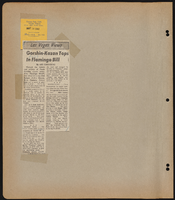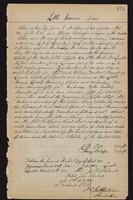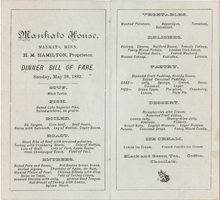Search the Special Collections and Archives Portal
Search Results
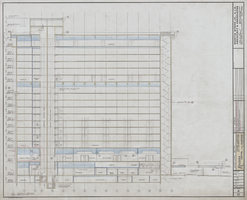
Architectural drawing of Riviera Hotel tower addition (Las Vegas), longitudinal section, December 12, 1973
Date
1973-12-12
Archival Collection
Description
Longitudinal building section for additions and alterations to the tower of the Riviera Hotel from 1974. Drawn by FD. Includes revision dates. Printed on mylar. John T. Iwamoto, delineator; Berton Charles Severson, architect; Brian Walter Webb, architect.
Site Name: Riviera Hotel and Casino
Address: 2901 Las Vegas Boulevard South
Image
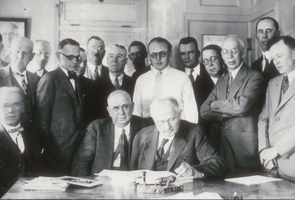
Slide of several officials signing the contract to construct Hoover Dam, April 18, 1931
Date
1931-04-18
Archival Collection
Description
Black and white image of officials from the Six Companies of San Francisco and the Bureau of Reclamation, as well as some local individuals, signing the contract to construct Hoover Dam (note: Boulder Dam was officially renamed Hoover Dam in 1947). Dr. Elwood Mead is signing the contract. Seated next to him is Henry J. Kaiser. Also identified in the photograph (in no particular order) are W.R. Armstrong, Walker Young, R.F. Walter, and Louis Crampton.
Image

Photograph of the North Las Vegas Exchange Club presenting a check to the Mothers Club of the North Las Vegas Boys Club, North Las Vegas, Nevada, December 19, 1972
Date
1972-12-19
Archival Collection
Description
North Las Vegas Exchange Club presents check to the Mothers Club of the North Las Vegas Boys' Club, North Las Vegas, Nevada, December 19, 1972. Pictured L-R: Warren Wilson, Bruce Therialt, Noel Thompson, Jo DaVan, Nadine Gemmer, and Mary Jane Brown.
Image
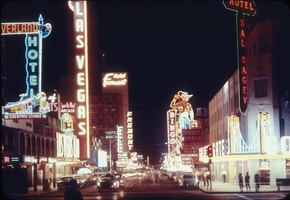
Slide of Fremont Street at night, Las Vegas, circa mid 1950s to 1960s
Date
1956 to 1966
Archival Collection
Description
Fremont Street looking southeast from Main Street in Las Vegas, Nevada, at night. The Overland Hotel, Jack Pot Arcade, Las Vegas Club, Silver Palace, Boulder Club, Hotel Apache and Hotel Fremont are seen on the south side of the street; the Golden Gate (formerly the Sal Sagev), the Monte Carlo Club, Vegas Vic outside of the Pioneer Club, and the Lucky Strike Club are seen on the north side of the street. Site Name: Fremont Street (Las Vegas, Nev.)
Image
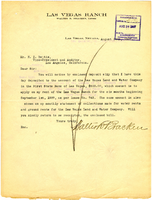
Letter from Walter R. Bracken to H. I. Bettis, August 24, 1907
Date
1907-08-24
Archival Collection
Description
Letter concern Bracken's lease payment on the Las Vegas Ranch.
Text
Pagination
Refine my results
Content Type
Creator or Contributor
Subject
Archival Collection
Digital Project
Resource Type
Year
Material Type
Place
Language
Records Classification

